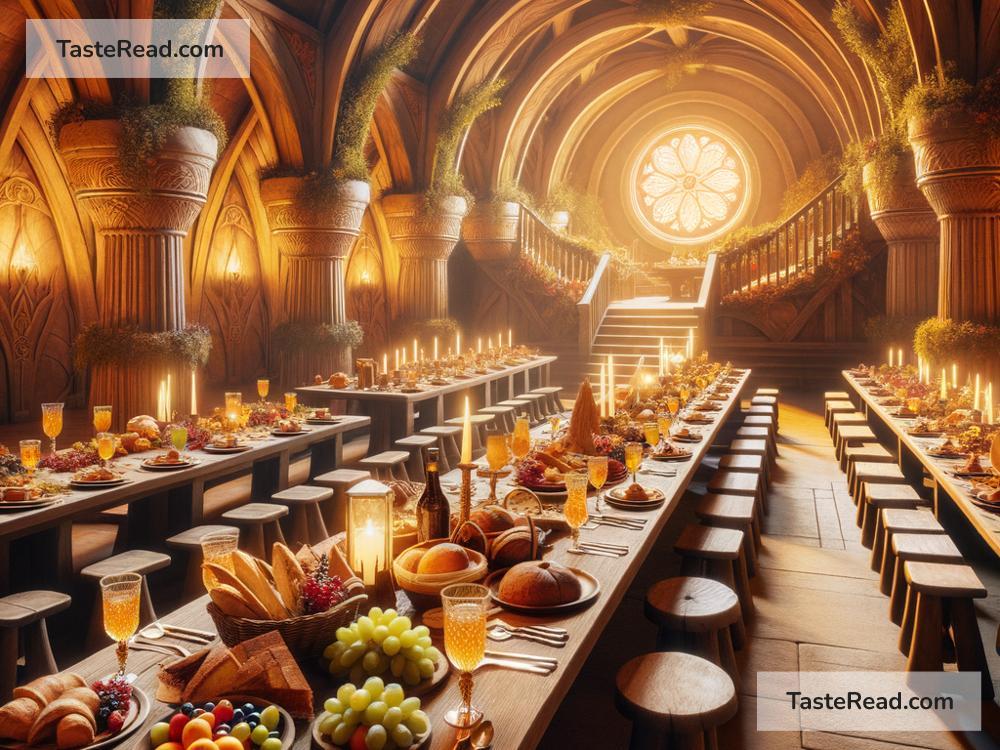Exploring the Feast at Rivendell in The Lord of the Rings
If you’ve read The Lord of the Rings by J.R.R. Tolkien or watched the movies, you might remember Rivendell—a beautiful, peaceful sanctuary hidden deep in the mountains. Rivendell is home to Elrond, a wise elf lord, and it’s often called “The Last Homely House East of the Sea.” This magical place serves as a safe haven for characters in the story, offering both rest and guidance to weary travelers. One of the most enchanting aspects of Rivendell is the hospitality the elves provide, especially their meals and gatherings.
In both the book and the movie, food is never just about eating; it represents fellowship, warmth, and comfort. While the feast at Rivendell isn’t described in great detail, we can imagine what it must have felt like—to dine in such a beautiful, enchanted place after enduring hardship. In this blog post, let’s explore the feast at Rivendell and what it tells us about the elves, their culture, and the atmosphere of Middle-earth.
Why Rivendell Matters
Rivendell is introduced to readers in The Hobbit and appears again in The Lord of the Rings. It is a sanctuary for those in need of healing, rest, or counsel, making it a key location in Tolkien’s world. After Frodo is injured by the Morgul blade (a weapon used by the evil Ringwraiths), Rivendell becomes his destination for recovery. When Frodo and his companions finally reach Rivendell, they are welcomed with open arms by Elrond and his household. The elves’ kindness is reflected in the food, atmosphere, and the sense of peace they provide.
This setting contrasts sharply with the dangers Frodo and his friends face in the wild. Rivendell symbolizes a place where goodness and beauty still thrive, untouched by the growing darkness in Middle-earth.
The Feast
The feast at Rivendell happens shortly after Frodo regains consciousness. He wakes up fully healed after his brush with death from the Morgul blade. His friends, including Aragorn, Sam, Merry, and Pippin, are there, and they’re all reunited in celebration. While Tolkien doesn’t give us a detailed menu or a long description of the meal itself, we can gather clues about its importance and imagine what such a feast might be like.
Elves are known for their grace, refinement, and connection to nature. Their food and drink reflect these qualities. It’s easy to imagine the feast at Rivendell as being rich in flavors yet simple and natural, featuring ingredients that honor the land. The table might have been filled with fresh bread, fruits, vegetables, nuts, cheeses, honey, and maybe even tender meats. Elven wine and mead likely added to the feeling of celebration, along with crystal-clear water from Rivendell’s springs.
More than the food itself, what makes the feast memorable is the mood. After days of running from danger and facing terrifying enemies, the group is finally able to relax. The elves treat them not only as guests but as friends, showing kindness and care. There’s laughter, joy, and a sense of relief as everyone gathers together. In Tolkien’s world, food is about connection—sharing meals means sharing fellowship, stories, and hope for the future.
Elven Hospitality
So, what does the feast at Rivendell tell us about the elves? For one, it shows their generous and welcoming nature. Elves live for centuries (sometimes even thousands of years), and their perspective on life is far different from humans. They value beauty, art, and nature, and they take the time to perfect everything they do, including their meals.
Unlike other cultures in Middle-earth, elves seem to live in harmony with their environment. Their food wouldn’t be wasteful or overly indulgent—it would reflect simplicity and balance. Tolkien often contrasts elven meals with the food of hobbits, who love rich, hearty dishes like stews and pies. Elves, while generous hosts, seem to prefer lighter fare that nourishes both the body and the soul.
The feast at Rivendell also reflects the elves’ love of gathering people together. They understand the importance of unity and friendship, especially in times of trouble. Around the table, guests feel a sense of belonging and safety. This is critical for Frodo and his companions, who are about to embark on a dangerous journey to destroy the One Ring.
What Rivendell Teaches Us
The feast in Rivendell may not stand out in The Lord of the Rings as much as the dramatic battles or the terrifying encounters with Sauron’s forces, but it carries deep meaning. It reminds us that food is not just about nourishment—it’s about comfort, joy, and connection.
In Rivendell, the feast embodies hope. At that moment, Frodo and his friends have a rare chance to breathe and gather strength for the journey ahead. It’s a pause in the larger story, a reminder that kindness and beauty still exist even when the world seems dark.
Tolkien’s description of Rivendell and its hospitality invites us to reflect on our own lives. How often do we make time to rest, enjoy a meal with friends, and appreciate the beauty around us? In a world that often feels as chaotic as Middle-earth, Rivendell teaches us the importance of slowing down and finding peace in each other’s company.
In the end, a meal at Rivendell isn’t just about the food. It’s about creating a space where everyone feels valued and cared for. Whether you’re a hobbit, dwarf, man, wizard, or elf, Rivendell welcomes all with open arms—that is the true magic of this legendary place.


